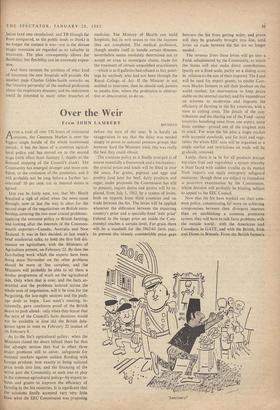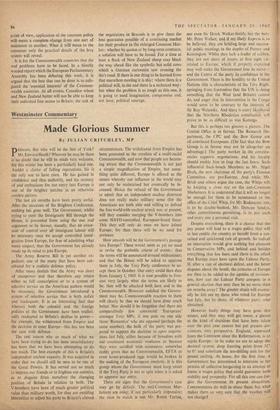Over the Weir
From JOHN LAMBERT
BRUSSELS
A FIER a total of over 150 hours of ministerial .M sessions, the Common Market is over the biggest single hurdle of the whole transitional period: it has the bases of a common agricul- tural policy and has moved on to the second stage (with effect from January 1, thanks to the fictional stopping .of the Council's clock). The Community has emerged stronger and more con- fident, to the confusion of the pessimists, and it will probably not be long before a further `ac- celerated' 10 per cent. cut in internal duties is agreed.
One can be fairly sure, too, that Mr. Heath breathed a sigh of relief when the news came through; now at last the way is clear for the second stage of the negotiations on British mem- bership, covering the two most crucial problems: applying the common policy to British farming, and looking after the interests of the Common- wealth exporters—Canada, Australia and New &aland. It was in fact decided, at last week's brief ministerial talks, to hold the first full dis- cussion on agriculture, with the Ministers of Agriculture present, on February 22. By then the fact-finding 'work which the experts have been doing since November on the other problems should be more or less complete, and the Ministers will probably be able to set them a similar programme of work on the agricultural side. Only when that is over, and the facts as- sembled and the problems isolated across the Whole area of negotiation, will it be time for the bargaining, the late-night sessions and the pack- age deals to begin.. Last week's meeting, in- cidentally, gave conclusive proof of the British desire to push ahead : only when they learnt that the texts of the Council's farm decisions would not be available in time did the British dele- gation agree to meet on February 22 instead of on February 8.
As to. the Six's agricultural policy: when the Ministers closed the doors behind them for that last all-night session they had in effect three major problems still to solve: safeguards for national markets against sudden flooding with foreign produce; how exactly to bring national Price levels into line; and the financing of the active part the Community as such was to play in the common agricultural policy—by export re- bates and grants to improve the efficiency of farming in the Six countries. It is significant that the solutions finally accepted vary very little from what the EEC Commission was proposing before the turn of the year. It is hardly an exaggeration to say that the delay was needed simply to prove to national pressure groups that however hard the Ministers tried, this was really the best they could obtain.
The common policy as it finally emerged is of course essentially a framework and a mechanism: the crucial prices and totals will be filled in over the years. For grains, pigmeat and eggs and poultry (and later for beef, dairy products and sugar, under proposals the Commission has still to present), import duties and quotas will be re- placed, from July 1, 1962, by a system of levies, both on imports from third countries and on trade between the Six. The levies will be applied whenever the difference between the exporting country's price and a specially-fixed `weir price' (related td the target price set inside the Com- munity) reaches a certain level, For grain there will be a standstill for the 1962-63 farm year, to prevent the already considerable price gaps. between the Six from getting wider, and prices will then be gradually brought into line, until levies on trade between the Six are no longer needed.
The revenue from these levies will go into a Fund, administered by the Community, to which the States will also make direct contributions (partly on a fixed scale, partly on a sliding scale in relation to the size of their imports). The Fund will be used for export grants, to enable Com- mon Market farmers to sell their produce on the world market; for intervention to keep prices stable on the internal market; and for expenditure on schemes to modernise and improve the efficiency of farming in the Six countries, with a view to cutting costs. The details of the con- tributions and the sharing out of the Fund—some countries benefiting most from one aspect, some from another—proved, one of the toughest nuts to crack. For wine the Six plan a single market with accepted standards, and for fruit and vege- tables the whole EEC area will be organised as a single market and restrictions on trade will be gradually removed.
Lastly, there is to be for all products (except top-class fruit and vegetables) a system whereby a State faced with sudden trouble on its market from imports can apply emergency safeguard measures: though these are subject to immediate a. posteriori examination by the Commission, whose decision will probably be binding, subject to appeal to the EEC Council.
Now that the Six have worked out their com- mon policy, concentrating far more on achieving compromises between their divergent interests than on establishing a common protective system, they will have to talk farm problems with the outside world: with the Americans and Canadians in GATT, and with the British, Irish and Danes in Brussels. From the British farmer's
'Sanctuary!'
point of view, application of the common policy will mean a complete change from one sort of assistance to another. What it will mean to the consumer only the practical details of the levy system will reveal.
It is for the Commonwealth countries that the real problems have to be faced. In a bluntly worded report which the European Parliamentary Assembly has been debating this week, it is argued that the best that can be done is to safe- guard the 'essential interests' of the Common- wealth countries. At all events, Canadian wheat and New Zealand butter will not be able to keep their unlimited free access to Britain; the task of the negotiators in Brussels is to give them the best guarantee possible of a continuing market for their produce in the enlarged Common Mar- ket: whether by quotas or by long-term contracts, a solution will have to be found. For a time at least a flock of New Zealand sheep may block the way ahead like the symbolic but solid cows which 'a German cartoonist saw crossing the Six's road. If there is one thing to be learned from that marathon meeting it is this: where there is.a political will, in the end there is a technical way: but when the problem is as tough as this one, it is going to need imagination, compromise and, not least, political courage.







































 Previous page
Previous page